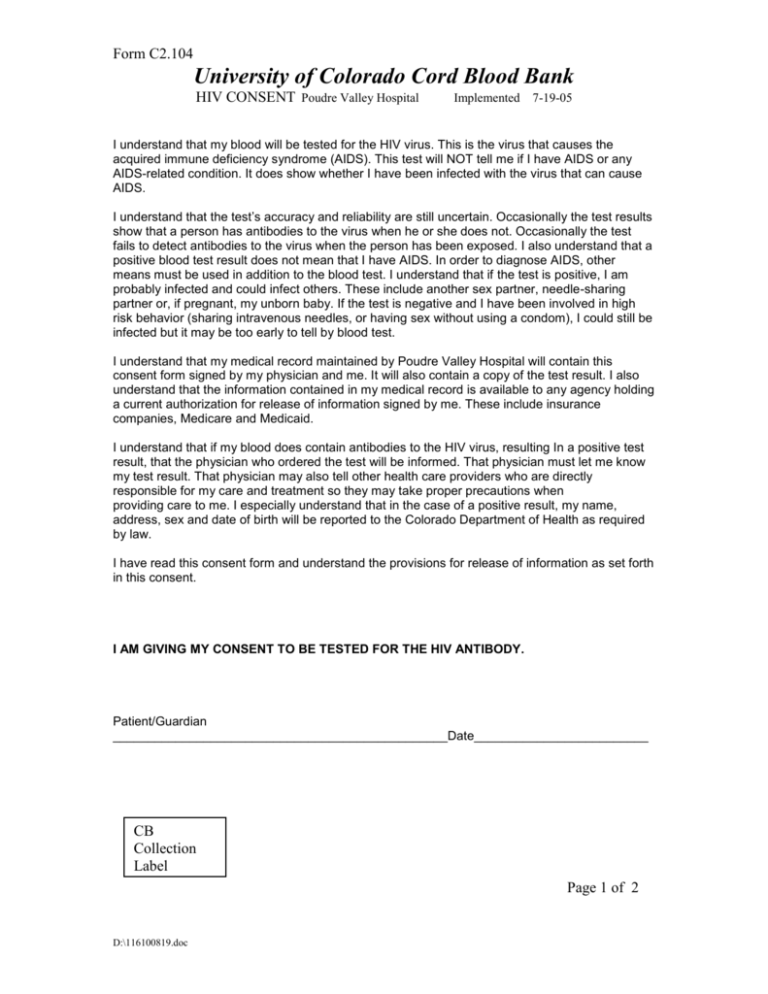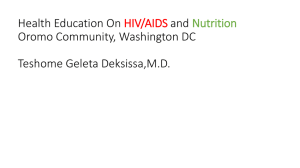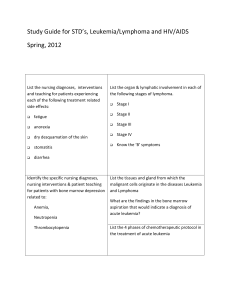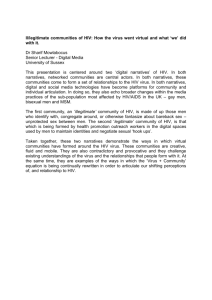
Form C2.104
University of Colorado Cord Blood Bank
HIV CONSENT Poudre Valley Hospital
Implemented
7-19-05
I understand that my blood will be tested for the HIV virus. This is the virus that causes the
acquired immune deficiency syndrome (AIDS). This test will NOT tell me if I have AIDS or any
AIDS-related condition. It does show whether I have been infected with the virus that can cause
AIDS.
I understand that the test’s accuracy and reliability are still uncertain. Occasionally the test results
show that a person has antibodies to the virus when he or she does not. Occasionally the test
fails to detect antibodies to the virus when the person has been exposed. I also understand that a
positive blood test result does not mean that I have AIDS. In order to diagnose AIDS, other
means must be used in addition to the blood test. I understand that if the test is positive, I am
probably infected and could infect others. These include another sex partner, needle-sharing
partner or, if pregnant, my unborn baby. If the test is negative and I have been involved in high
risk behavior (sharing intravenous needles, or having sex without using a condom), I could still be
infected but it may be too early to tell by blood test.
I understand that my medical record maintained by Poudre Valley Hospital will contain this
consent form signed by my physician and me. It will also contain a copy of the test result. I also
understand that the information contained in my medical record is available to any agency holding
a current authorization for release of information signed by me. These include insurance
companies, Medicare and Medicaid.
I understand that if my blood does contain antibodies to the HIV virus, resulting In a positive test
result, that the physician who ordered the test will be informed. That physician must let me know
my test result. That physician may also tell other health care providers who are directly
responsible for my care and treatment so they may take proper precautions when
providing care to me. I especially understand that in the case of a positive result, my name,
address, sex and date of birth will be reported to the Colorado Department of Health as required
by law.
I have read this consent form and understand the provisions for release of information as set forth
in this consent.
I AM GIVING MY CONSENT TO BE TESTED FOR THE HIV ANTIBODY.
Patient/Guardian
________________________________________________Date_________________________
CB
Collection
Label
Page 1 of 2
D:\116100819.doc
Form C2.104
University of Colorado Cord Blood Bank
HIV CONSENT Poudre Valley Hospital
Implemented
7-19-05
What is an HIV Test?
Human Immunodeficiency Virus (HIV) is the virus that causes Acquired Immune Deficiency
Syndrome (AIDS).
Laboratory tests tell whether you have been infected with HIV. A test is not considered positive
unless a different backup test is done and also reads positive. Test results that are inconclusive
should be discussed with your health professional.
These tests are conducted on a single sample of your blood.
Will the HIV test tell me if I have AIDS?
No. A positive finding means you have been exposed to the virus and that you have become
infected. While some people infected with the virus have gone on to develop AIDS, others have
not. Changes in lifestyle, diet, behavior and early treatment may help you delay or avoid the
development of AIDS. These tests will not tell you if you have AIDS,
whether you will develop AIDS or how long you’ve been infected.
How does a person become infected with HIV?
The virus is most commonly spread through sexual contact (vaginal, anal or oral sex). It also is
commonly spread by sharing of dirty needles/works during illegal use of (shooting) intravenous
drugs. An infected mother may infect her baby during pregnancy, at the time of birth, or while
breast feeding. Very rarely, contact with blood in other ways may also spread the virus. You can
NOT get infected with the virus by donating blood.
Are there any risks involved in having the test done?
There are virtually no medical risks in drawing a small sample of blood. Only sterile needles and
syringes are used for this purpose. Once the needle or syringe is used, it is safely thrown away.
Before you are tested, you should carefully think about to whom you would tell the results and
what emotional and support systems are available to you. If you are not sure, discuss this with
your health professional now. While health professionals are required to keep this information
confidential, others outside the health profession are concerned about HIV and AIDS. Some
people may not understand the nature of the infection, and this misunderstanding may result in
problems with family, friends, coworkers or others.
As with any serious health problem, some people who have taken the test and who have
discovered that they are now infected with HIV have experienced emotional problems. Your
health professional is aware of support programs for people who test positive. You, however,
should carefully consider what support you may require if you test positive.
What if I have more questions?
Please ask the health professional who gave you this consent. Your health professional will have
the answers to your questions or will be in a position to get the answers for you.
Page 2 of 2
D:\116100819.doc
Form C2.104
University of Colorado Cord Blood Bank
HIV CONSENT Poudre Valley Hospital
Implemented
7-19-05
DONOR EDUCATIONAL MATERIALS
MAKING YOUR CORD BLOOD DONATION SAFE
Thank you for agreeing to donate cord blood today! This information sheet explains how
YOU can help us make the donation process safe for yourself and patients who might
receive your blood. PLEASE READ THIS INFORMATION BEFORE YOU DONATE! If
you have any questions now or anytime during the screening process, please ask
the staff.
ACCURACY AND HONESTY ARE ESSENTIAL!
Your complete honesty in answering all questions is very important for the safety of
patients who receive your blood. All information you provide is confidential.
DONATION PROCESS:
To determine if you are eligible to donate we will:
-Ask questions about health, travel, and medicines
-Ask questions to see if you might be at risk for hepatitis, HIV, or AIDs
- Ask questions about your family history
If you are able to donate we will:
- Cleanse your umbilical cord with an antiseptic.
-Use a new, sterile, disposable needle to collect your cord blood
DONOR ELIGIBILITY – SPECIFIC INFORMATION
Why we ask questions about sexual contact:
Sexual contact may cause contagious diseases like HIV to get into the bloodstream and
be spread through transfusions to someone else.
Definition of “sexual contact”:
The words “have sexual contact with” and “sex” are used in some of the questions we
will ask you, and apply to any of the activities below, whether or not a condom or other
protection was used:
1. Vaginal sex (contact between penis and vagina)
2. Oral sex (mouth or tongue on someone’s vagina, penis, or anus)
3. Anal sex (contact between penis and anus)
HIV/AIDS RISK BEHAVIORS AND SYMPTOMS
AIDS is caused by HIV. HIV is spread mainly through sexual contact with an infected
person OR by sharing needles or syringes used for injecting drugs.
D:\116100819.doc
Form C2.104
University of Colorado Cord Blood Bank
HIV CONSENT Poudre Valley Hospital
Implemented
7-19-05
DONOR EDUCATIONAL MATERIALS
DO NOT DONATE IF YOU:
-Have AIDS or have ever had a positive HIV test
-Have ever used needles to take drugs, steroids,
or anything not prescribed by
your doctor
- Had sex with a male who has had sexual contact with another male, even once,
since 1977
- Have ever taken money, drugs or other payment for sex since 1977
- Have had sexual contact in the past 12 months with anyone described above
- Have had syphilis or gonorrhea in the past 12
months
- In the last 12 months have been in juvenile detention, lockup, jail or prison for more
than 72 hours
-Have any of the following conditions that can be signs or symptoms of HIV/AIDS:
Unexplained weight loss or night sweats
Blue or purple spots in your mouth or skin
Swollen lymph nodes for more than one month
White spots or unusual sores in your mouth
Cough that won’t go away or shortness of breath
Diarrhea that won’t go away
Fever of more than 100.5 oF for more than 10 days
Remember that you CAN give HIV to someone else through blood even if you feel well
and have a negative HIV test. This is because tests cannot detect infections for a period
of time after a person is exposed to HIV. If you think you may be at risk for HIV/AIDS
or want an HIV/AIDS test, please ask for information about other testing facilities.
PLEASE DO NOT DONATE TO GET AN HIV TEST!
Travel to or birth in other countries
Blood donor tests may not be available for some contagious diseases that are found
only in certain countries. If you were born in, have lived in, or visited certain countries,
you may not be eligible to donate.
What happens after your donation:
To protect patients, your blood is tested for hepatitis B and C, HIV, certain other viruses,
and syphilis. If your blood tests positive it will not be given to a patient. You will be
notified about test results that may disqualify you from donating in the future. Please do
not donate to get tested for HIV, hepatitis, or any other infections!
Thank you for donating your cord blood today!
University of Colorado Cord Blood Bank
(303) 724-1306
D:\116100819.doc
Form C2.104
University of Colorado Cord Blood Bank
HIV CONSENT Poudre Valley Hospital
Implemented
7-19-05
DONOR EDUCATIONAL MATERIALS
What is an HIV Test?
Human Immunodeficiency Virus (HIV) is the virus that causes Acquired Immune
Deficiency Syndrome (AIDS).
Laboratory tests tell whether you have been infected with HIV. A test is not
considered positive unless a different backup test is done and also reads
positive. Test results that are inconclusive should be discussed with your health
professional.These tests are conducted on a single sample of your blood.
Will the HIV test tell me if I have AIDS?
No. A positive finding means you have been exposed to the virus and that you
have become infected. While some people infected with the virus have gone on
to develop AIDS, others have not. Changes in lifestyle, diet, behavior and early
treatment may help you delay or avoid the development of AIDS. These tests will
not tell you if you have AIDS, whether you will develop AIDS or how long you’ve
been infected.
How does a person become infected with HIV?
The virus is most commonly spread through sexual contact (vaginal, anal or oral
sex). It also is commonly spread by sharing of dirty needles/works during illegal
use of (shooting) intravenous drugs. An infected mother may infect her baby
during pregnancy, at the time of birth, or while breast feeding. Very rarely,
contact with blood in other ways may also spread the virus. You can NOT get
infected with the virus by donating blood.
Are there any risks involved in having the test done?
There are virtually no medical risks in drawing a small sample of blood. Only
sterile needles and syringes are used for this purpose. Once the needle or
syringe is used, it is safely thrown away.
Before you are tested, you should carefully think about to whom you would tell
the results and what emotional and support systems are available to you. If you
are not sure, discuss this with your health professional now. While health
professionals are required to keep this information confidential, others outside
the health profession are concerned about HIV and AIDS. Some people may not
understand the nature of the infection, and this misunderstanding may result in
problems with family, friends, coworkers or others.
As with any serious health problem, some people who have taken the test and
who have discovered that they are now infected with HIV have experienced
emotional problems. Your health professional is aware of support programs for
people who test positive. You, however, should carefully consider what support
you may require if you test positive.
What if I have more questions?
Please ask the health professional who gave you this consent. Your health
professional will have the answers to your questions or will be in a position to get
the answers for you.
D:\116100819.doc





